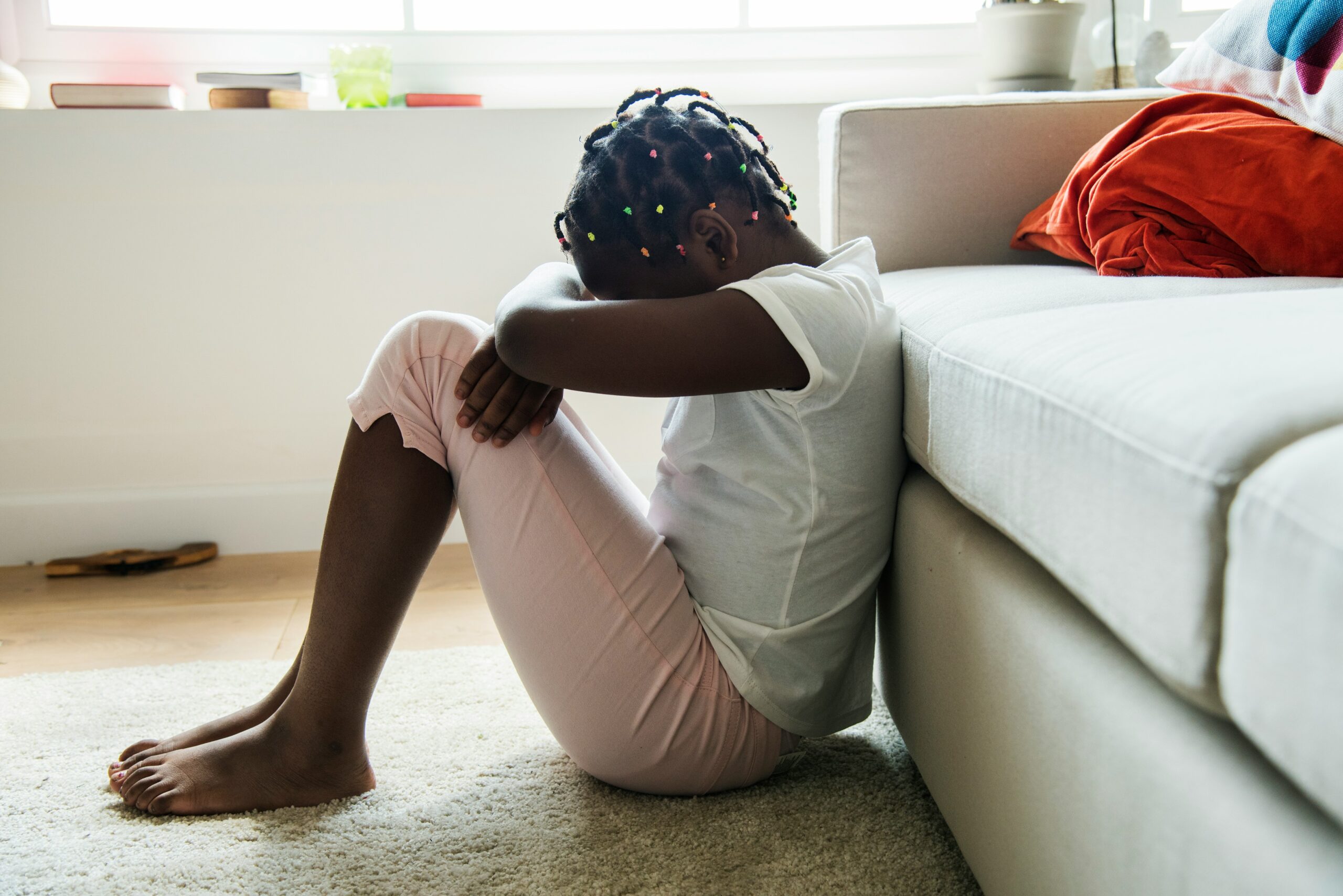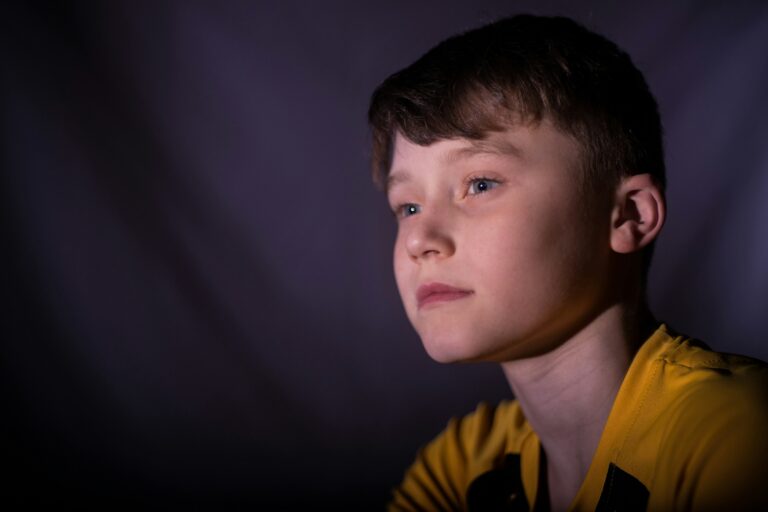The Anxious Student: Recognising when back-to-school nerves become something more
4-6 minute read.

September brings a familiar rhythm of new pencil cases, fresh uniforms, and that mix of excitement and nerves that comes with a new school year. But when do those normal butterflies cross the line into something that needs more than just a reassuring cuddle?
As children and young people’s counselling specialists, we see a real spike in enquiries each September. The transition back to school can be overwhelming, and it’s not always easy to tell the difference between typical adjustment anxiety and signs that your child needs additional support.
Normal Back-to-School Nerves vs Signs of Anxiety in Children
Pretty much every child feels some apprehension about returning to school. New teachers, different classrooms, friendship dynamics that may have shifted over the holidays – it’s completely natural for children to feel unsettled.
Normal back-to-school nerves typically include:
- Feeling butterflies on the first day
- Taking a few days to settle back into routine
- Occasional worries about homework or tests
- Mild reluctance about getting up early again
- Brief moments of missing the holidays
- These feelings usually settle within the first week or two as children readjust to school life.
Signs of anxiety in children that may need attention:
- Persistent worry that doesn’t improve after the first few weeks
- Physical symptoms like headaches, tummy aches, or feeling sick before school
- Sleep disruption such as difficulty falling asleep, frequent waking, or nightmares about school
- Extreme emotional reactions – meltdowns, panic, or becoming completely withdrawn
- Refusing to go to school or becoming distressed at the mere mention of it
- Regression in behaviour, such as bedwetting, clinging, or losing skills they’d previously mastered

The Stressed Student: When Academic Pressure Takes Its Toll
Academic anxiety affects children differently at various ages, but the stressed student often shows specific patterns of behaviour that parents and teachers can learn to recognise.
In primary school children, look for:
- Excessive worry about getting answers wrong
- Perfectionist tendencies that cause distress
- Avoiding activities they used to enjoy
- Becoming easily frustrated with homework
- Needing constant reassurance about their work
Secondary school students may show:
- Procrastination that leads to last-minute panic
- Comparing themselves negatively to classmates
- Physical tension manifesting in headaches, muscle aches, and feeling constantly tired
- Changes in appetite or eating patterns
- Social withdrawal, particularly around academic topics
The pressure of returning to formal learning after weeks of holiday freedom can feel overwhelming. For some children who are stressed students, academic demands trigger genuine anxiety responses.
Why September Can Trigger Childhood Anxiety
The back-to-school transition involves multiple stressors happening at the same time:
Social pressures intensify as children navigate friendships that may have changed over the summer. Have their friends moved on? Will they fit in with their peer group? These social anxieties can feel enormous to young minds.
Academic expectations typically become more pronounced in September. Moving up a year group, facing new subjects, or dealing with increased homework loads can trigger anxiety in children who worry about meeting expectations.
Routine disruption affects children more than many adults realise. The shift from relaxed holiday schedules to rigid school timetables can be jarring, even for children who thrive on routine.
Separation anxiety can resurface even in older children who’ve been fine with school in previous years. The summer break can reset attachment patterns, making the daily goodbye feel difficult again.
Physical Signs Your Child’s Anxiety Needs Attention
Children often express emotional distress through physical symptoms. These psychosomatic responses are real and shouldn’t be dismissed as “attention-seeking” behaviour.
Morning symptoms are particularly common:
- Feeling sick or actually vomiting before school
- Headaches that appear on school days but not weekends
- Tummy pain that doesn’t have a medical cause
- Feeling dizzy or shaky when thinking about school
Sleep-related signs include:
- Difficulty falling asleep, especially on Sunday nights
- Waking frequently during the night
- Early morning waking with worry thoughts
- Nightmares or anxiety dreams about school scenarios
Behavioural changes might include:
- Increased clinginess or following you around the house
- Regression in independence – needing help with tasks they could do before
- Emotional outbursts that seem disproportionate to triggers
- Changes in appetite – either eating much more or much less

Supporting Your Anxious Child: Practical Strategies
Creating a supportive environment starts with validation. Acknowledge that their feelings are real and understandable, even if the situation doesn’t seem worrying to you.
Establish predictable routines that help your child feel secure. Consistent bedtimes, morning routines, and after-school patterns provide stability during periods of change.
Practise problem-solving together rather than immediately offering solutions. Ask: “What do you think might help?” or “What could we try?”. This builds their confidence in handling challenges.
Create a worry time – a specific window of 10-15 minutes each day when anxious thoughts are allowed and discussed, but outside this time, worries get “parked” until the designated time.
Teach simple breathing techniques that children can use in the moment. The “flower and candle” method works well – smell the flower (breathe in slowly) and blow out the candle (breathe out slowly).
Communicate with school so teachers understand what your child is experiencing. Most schools are very willing to make small adjustments that can make a big difference.
When to Seek Professional Support for Childhood Anxiety
While many children settle into the school routine with time and support, some need additional help to manage their anxiety effectively.
Consider professional support when:
- Anxiety symptoms persist beyond the first month of term
- Physical symptoms are frequent or severe
- Your child’s anxiety is affecting their ability to participate in activities they used to enjoy
- Sleep problems continue despite establishing good routines
- Family life is significantly impacted by your child’s anxiety
- School attendance becomes a daily battle
At Now You’re Talking, we understand that childhood anxiety isn’t something children simply “grow out of”. It’s something they can learn to manage with the right support. Our child-centred approach helps young people develop coping strategies while addressing the underlying concerns driving their anxiety.
The Difference Professional Therapy for Children and Young People Makes
Children’s counselling provides a safe space where young people can explore their worries without fear of judgment or letting anyone down. Through age-appropriate techniques, including play therapy for younger children, we help them:
- Understand what anxiety feels like in their body and mind
- Develop practical tools for managing worried thoughts
- Build confidence in their ability to cope with challenges
- Improve communication about their feelings with family and teachers
Our flexible approach means we can work with your child online or in person, whatever feels most comfortable for them. There are no lengthy waiting lists, and you can have a free 15-minute call with our therapists before committing, to make sure they are the right fit for your child.
Looking Ahead: Building Resilience for the School Year
Supporting an anxious child isn’t about eliminating all stress – it’s about helping them develop resilience and coping strategies that will serve them well throughout their education and beyond.
With the right support, children learn that they can handle challenges, that difficult feelings are temporary, and that asking for help is a sign of strength, not weakness.
If your child’s back-to-school anxiety feels like more than typical adjustment difficulties, you don’t have to navigate this alone. Professional support can make the difference between a year of struggle and a year of growth and confidence
Ready to support your child’s wellbeing this school year?
Book a free 15-minute consultation to discuss how our children’s counselling services can help your family thrive.


